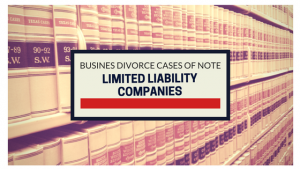
Few of us have the liquidity that we need to contemplate the divorce while we are making plans to get marriedIt just doesn’t enter our minds at the time and, of course, when if it does later become an issue, it is way too late to come to an easy decision about how to handle the breakup.
The same is true for businesses. It is difficult to get the new business owners to focus on what they will do if one leaves — and the probability is that one will — when they are in the formation mindset. It’s a type of honeymoon, I suppose, full of optimism and promise. And yet, experience says that if the business survives long enough, the absence of a buy-sell provision is going to create an issue, and maybe event a lawsuit.
Business owners need to reflect on the fact that with enough success, they will want to retire, or may become disabled or die. That they might want to bring children into the business. Or that one of them will undergo some type of personal change or circumstances that just makes it impossible to carry on. A company’s organizing documents without a buy-sell in some form or fashion is incomplete. It keeps the litigators happy, but it’s not wise. Chris Mercer’s blog post here talks about some of the elements that you find in a reasonable buy-sell agreement.







 Petitioning members and managers of limited liability companies need to choose carefully between dissolution and dissociation of a member when they initiate litigation to expel a “bothersome” member. If the petitioning member includes grounds for both, they will not be able to choose the preferred remedy. Rather, the trial judge has discretion to choose between the two remedies without consideration of the preferences of any of the parties. The District Court of Appeals has held that the D.C. Code “substantially mirror[s]” language in the Revised Uniform Limited Liability Company Act (RULLCA), which grants discretion to trial judges to decide between dissolution and dissociation when grounds for both causes of action are present.
Petitioning members and managers of limited liability companies need to choose carefully between dissolution and dissociation of a member when they initiate litigation to expel a “bothersome” member. If the petitioning member includes grounds for both, they will not be able to choose the preferred remedy. Rather, the trial judge has discretion to choose between the two remedies without consideration of the preferences of any of the parties. The District Court of Appeals has held that the D.C. Code “substantially mirror[s]” language in the Revised Uniform Limited Liability Company Act (RULLCA), which grants discretion to trial judges to decide between dissolution and dissociation when grounds for both causes of action are present.


 The subject of the Appellate Division’s recent decision in
The subject of the Appellate Division’s recent decision in 
